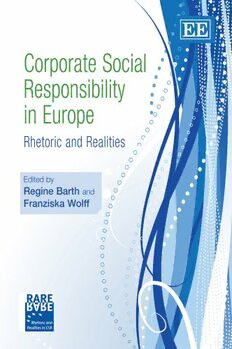
Corporate Social Responsibility in Europe: Rhetoric and Realities PDF
375 Pages·2009·4.777 MB·English
Most books are stored in the elastic cloud where traffic is expensive. For this reason, we have a limit on daily download.
Preview Corporate Social Responsibility in Europe: Rhetoric and Realities
Description:
The acid test of corporate social responsibility (CSR) is simply this: does it lead to positive impacts on society and the environment or is it just rhetoric? And how can these impacts be enhanced? This timely book tackles this cutting-edge challenge by presenting empirical findings from a range of surveys and in-depth case studies. These build on a new methodological and theoretical framework for assessing and explaining the sustainability impact of CSR. For selected sustainability issues - mitigation of climate change and chemical risk, resource management in marine fisheries, promotion of gender equality and countering of bribery - and within different European industries, the authors show that the rhetoric of CSR is still stronger than its reality. However, the reality of CSR is strong enough to allow for some rhetoric. The authors name both the success factors for, and limits of, producing sustainable impacts through CSR. Finally, they discuss its contribution to achieving public policy goals and the governance paradigms that are necessary to make CSR effective. This book will be invaluable for both students and researchers interested in the effects of CSR, and will prove a useful tool for both policy-makers and CSR practitioners alike.
See more
The list of books you might like
Most books are stored in the elastic cloud where traffic is expensive. For this reason, we have a limit on daily download.
